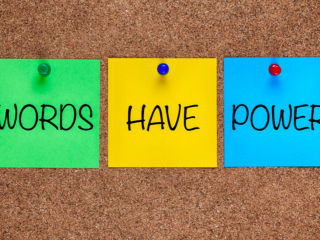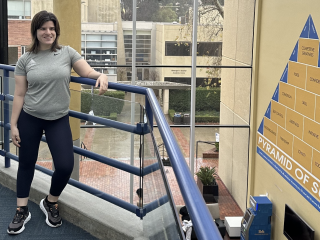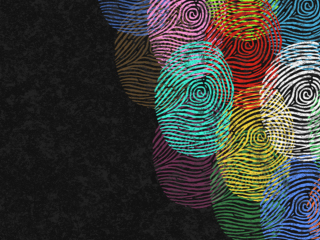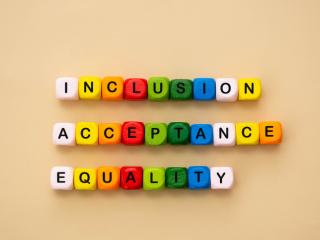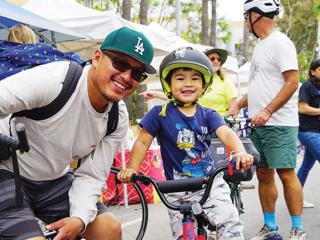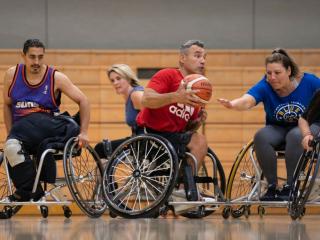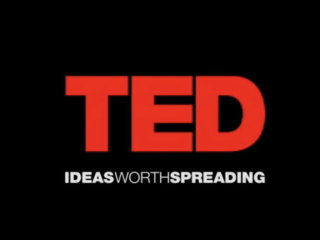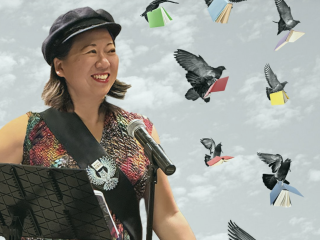In times when some are casting doubt on the value of higher education, it is critical to remember that our mission is a powerful force for good in the world. What we discover and create at UCLA leads to medical breakthroughs, economic advancement, improved national security and greater global competitiveness.
Administration Equity Council
Public service is a powerful way to reconnect with others and with your purpose. Getting started is easier than you think.
Understanding the language behind community engagement helps foster deeper connections and more meaningful participation. Here are key terms:
Community engagement and service are at the heart of fulfilling UCLA’s mission of bettering global society. Here are just a few ways to get involved.
This curated list of upcoming events and observances highlights key moments that celebrate inclusion, promote equity and encourage dialogue across differences.
Thriving communities create environments where individuals feel seen, supported and empowered. One way to foster that spirit is through volunteering.
Mental health is key to overall well-being. Small daily habits—like getting enough sleep, moving your body, setting manageable goals, staying connected, practicing mindfulness and seeking professional help—can build resilience and improve mood. These steps, though simple, create lasting positive momentum for maintaining and enhancing your mental health over time.
In addition to UCLA resources, free mental health tools are available from NAMI, MHA, Active Minds and The Trevor Project. LinkedIn Learning and TED Talks offer expert-led courses and talks on stress, resilience and mental wellness. These resources support personal growth, awareness and inclusive mental health conversations for all.
Using inclusive language helps reduce the stigma around mental health. Avoid using clinical terms like “OCD” or “depressed” to describe everyday moods, as this minimizes real conditions. People-first language—such as “a person with ADHD”—respects individuals’ identities and promotes a more supportive, understanding and welcoming environment for everyone.
Spring and summer in Los Angeles bring vibrant celebrations and cultural events—from Mental Health Awareness Month and Pride festivals to Juneteenth and the LA County Fair. Explore art, music, food and wellness activities across the city, honoring vibrant communities and embracing the season’s energy, creativity and connection.
May is Mental Health Awareness Month, spotlighting the importance of mental well-being and early intervention. With 1 in 7 Californians experiencing mental illness, UCLA offers vital support through the Faculty and Staff Counseling Center and behavioral health benefits. These resources ensure accessible, confidential care for all employees, promoting a healthier workplace.
When working with individuals with developmental disabilities, it's important to remember that everyone brings unique skills and abilities to their job. As a co-worker or supervisor, you can create a more supportive and welcoming work environment by focusing on abilities rather than disabilities, using clear communication, offering assistance when needed and engaging in regular conversations about common interests. Avoid dramatic reactions to their disabilities, as most individuals have adapted positively to their challenges. These practices help foster a team-oriented and respectful workplace.
Various learning materials are available to the UCLA community and linked in this article, including the book "Unmasking Autism" by Devon Price and "Spectrum Women" by Barb Cook & Dr. Michelle Garnett, which explore neurodiversity and personal experiences. UCLA employees also have free access to LinkedIn Learning courses on supporting workers with disabilities and understanding ADHD in the workplace. Additionally, you can enjoy a TEDxUCLA talk, where Russell Lehmann discusses his journey with autism.
The CDC defines developmental disabilities as conditions that impair physical, learning, language or behavior areas, often starting before birth but sometimes occurring after due to injury or infection. These disabilities, which typically last a lifetime, can affect daily functioning. Examples include ADHD, autism spectrum disorder, cerebral palsy, hearing loss, Tourette syndrome, and epilepsy. Using people-first language, such as "person with a disability," acknowledges that a disability is part of a person's identity but not their entirety.
The Supported Training and Employment Program (STEP) at UCLA, established in 2019, aims to create meaningful employment opportunities for individuals on the autism spectrum. Despite a temporary pause due to the pandemic, the program has successfully placed 30 individuals in various positions within UCLA and the local workforce, fostering independence and productivity.
March and April feature several recognition months and days to honor the contributions of various community members. March includes Developmental Disabilities Awareness Month, Women’s History Month and National Deaf History Month, along with specific days like International Women’s Day and World Down Syndrome Day. April highlights National Arab American Heritage Month, National Sexual Assault Prevention and Awareness Month, World Autism Awareness Day and the Festival of Ridvan, celebrated by Bahá'ís. These observances aim to raise awareness and celebrate the achievements of different groups.
Language is crucial for fostering diversity, equity, inclusion and belonging. Learn more about respectful language to use when speaking to and about people from North, Central and South America who identify as American Indian, Indian, Native American, Indigenous or Native.
Learning about the lives of others and the ways we can help create stronger workplaces and communities as community-builders and allies is a year-round opportunity. Take advantage of your free LinkedIn Learning account, UCLA Library privileges and other community resources.
Explore culture, expand your knowledge, enjoy yourself and meet new people. Here’s a glimpse of what’s coming up, including CicLAvia: the Valley, art and museum exhibits, and the Hollywood Pow Wow and LA Skins Fest sponsored by the UCLA American Indian Studies Center.
Native American knowledge and innovation have impacted many facets of life. Among them: traditional medicine’s influence on Western healthcare, the creation of kayaks, baby bottles, snow goggles, and other items, and the impact of Native American scholars in myriad professions and academic fields.
Disability etiquette encompasses guidelines and practices that promote dignity, accessibility and inclusivity when interacting with people of all abilities. By fostering genuine respect and understanding, we can create environments where everyone feels valued and respected. Learn more about this important topic and take away some fantastic tips.
The 2024 Paralympics in Paris are here! Meet British swimmer, world finalist and British record holder Will Perry as he shares his story of success that challenges behaviors towards people with conditions of dwarfism. Also check out A Winning Mindset, the official podcast of the Paralympic Games, and stay up to date on all the action by bookmarking the official website of the Paris 2024 Paralympic Games.
Language is a crucial tool for fostering diversity, equity, inclusion and belonging. Learn more about respectful language to use when speaking to and about individuals living with disabilities. Terms are published in “The Inclusive Language Handbook: A Guide to Better Communication & Transformational Leadership” by Jackie Ferguson and Roxanne Bellamy. For more, see the Administration Equity Council's EDI Glossary of Terms.
Gather your friends and family for some fantastic free and low-cost activities in our local area. It’s an incredible location to explore culture, learn, have fun and connect with others. From museum days, exhibits and evenings of music, art, food, and drink, and events highlighting National Hispanic American Heritage Month and Native American Heritage Month, here are just a sample of things to look forward to.
The Paralympics shines a light on athletes with disabilities and builds excitement around competitive adaptive sports. UCLA Recreation’s Adaptive Program Coordinator Michael Garafola is working to expand the adaptive sports landscape on campus with various adaptive sports and recreational opportunities, including wheelchair basketball, which is open to all.
Learning about the issues facing people with lived experiences and social identities that many be different from our own is an important step in making connections, deepening relationships and better understanding those around us. Here are a few TEDTalks that share different perspectives from members of the LGBTQIA+ community.
The Los Angeles area is an incredible location to explore culture, learn, have fun and connect with others. Here is just a sample of what is happening.
Through the work of the Gender Recognition Implementation Committee and team members in UCLA Administration, our campus is home to more than 300 gender-inclusive restrooms and has updated its data systems to recognize individuals by their lived names and accurate genders. Forms for requesting updates to personal information must be submitted by June 30, 2024.
The journey toward equity, diversity, and inclusion (EDI) requires practice and the ability to face assumptions and insecurities. It's important to recognize that mistakes are part of the process, even for allies.














